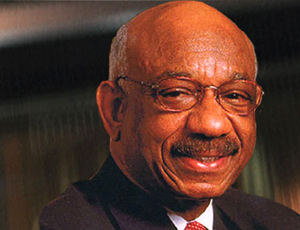
Herman J. "HJ" Russell, whose instinct to buy a vacant Atlanta lot at age 16 propelled him to found a construction and real estate firm involved in building many city landmarks—and made him one of the country's most successful and well-known black entrepreneurs and civil rights activists—died on Nov. 15 at age 83 after a brief illness, says a company spokeswoman.
Russell, the son of a plasterer, founded H.J. Russell & Co. in the 1950s, before graduating with a building construction degree from Tuskegee Institute, now Tuskegee University.
Over the next five decades, his company grew as metropolitan Atlanta did, and Russell formed bonds with area contractors as well as with political and business leaders.
According to one biography, his firm had revenue of approoximately $150 million and employed about 700.
The company is among those on the team now building Atlanta's $1.3-billion Falcons Stadium.
Robert Holder, founder and former chairman of Atlanta-based Holder Construction, told ENR that his association with Russell dated to 1970 and that his firm was the first with which Holder ever joint-ventured, involving work on a Delta terminal in the 1980s at what is now Hartsfield-Jackson Atlanta airport.
"He was an incredible entrepreneur and always did more than his share. He was a prodieous worker, a hard driver and smart," said Holder. "Herman was successful long before civil rights and would have been without affirmative action."
Russell was the first black member of Atlanta's Chamber of Commerce in 1963, and was later president, and he was elected into the National Association of Minority Contractors Hall of Fame in 1990.
H.J. Russell ranked among the ENR Top 400 Contractors, most recently in 2012. His construction, real estate and business empire made him the head of one of the country's five largest black-owned businesses, a legacy recounted in an autobiography released earlier this year.
"Herman was a fighter," says Paul King, a former contractor and minority-rights activist in Chicago. "He didn't go out and shut down construction sites," King adds, but supported integration and affirmative action through his own efforts and by financially backing activists in construction and outside.
Russell endowed the Herman J. Russell Sr. International Center for Entrepreneurship at Georgia State University and published a memoir earlier this year, enttled Building Atlanta: How I Broke Through Segregation to Launch a Business Empire.





Post a comment to this article
Report Abusive Comment